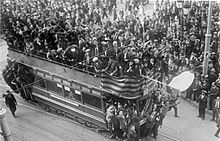Spanish Constitution of 1931
"[1] According to the historian Mary Vincent the Constitution envisaged "a reforming regime with an explicit and self-conscious view of what modernising Spain should entail.
A secular state operating according to the rule of law with an admittedly ill-defined sense of social justice would open the way for an educated body of citizens to enjoy 'European' prosperity and freedom.
"[2] According to Frances Lannon however, the articles on property and religion, with their exaltation of state power and disregard for civil rights, "virtually destroyed any prospect there had been for the development of a Catholic, conservative, Republicanism.
[4][5] The Second Republic began on 14 April 1931 after the departure from Spain of King Alfonso XIII, following local and municipal elections in which republican candidates won the majority of votes in urban areas.
Though Alfonso did not formally abdicate, his departure from the country led to a provisional government under Niceto Alcalá Zamora, and a constituent Cortes drew up a new constitution.
"[12] Pope Pius XI condemned the Spanish Government's deprivation of the privileges of Catholics in the encyclical Dilectissima Nobis ("On Oppression Of The Church Of Spain").
Robles wanted to use mass meetings "to give supporters of the right a sense of their own strength and, ominously, to accustom them 'to fight, when necessary, for the possession of the street.
'"[14] The conservative Catholic Republicans Alcalá-Zamora and Miguel Maura resigned from the government[3] when the controversial articles 26 and 27 of the constitution, which strictly controlled Church property and prohibited religious orders from engaging in education were passed.
[9] Frances Lannon calls the constitution "divisive" in that the articles on property and religion, prioritizing state power, had a "disregard for civil rights" and ruined the prospect of the development of a Catholic, conservative, Republicanism.
[3] Likewise, Stanley Payne agrees that the constitution generally accorded a wide range of civil liberties and representation with the notable exception of the rights of Catholics, a circumstance which prevented the formation of an expansive democratic majority.
[5] Commentators have posited that such a "hostile" approach to the issues of church and state were a substantial cause of the breakdown of democracy and the onset of civil war.
[17] However, this freedom would be curbed by the Franco's dictatorial regime that granted the Roman Catholic Church the status of official religion of Spain and prohibited other public religious manifestations.

